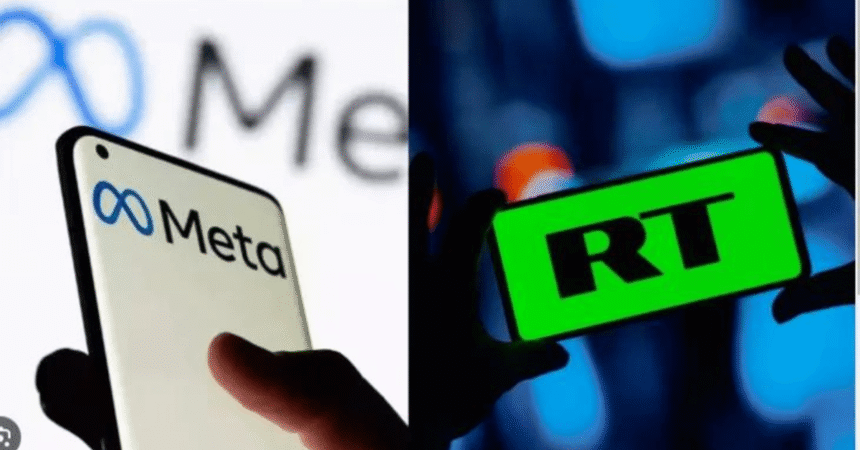In a significant move to curb foreign influence operations, Meta, the parent company of Facebook, Instagram, WhatsApp, and Threads, has announced a global ban on Russian state media outlets, including RT (Russia Today) and Rossiya Segodnya. This action marks a pivotal moment in the ongoing battle against misinformation and covert influence campaigns, particularly those emanating from Russia.
Background
Meta’s decision to ban Russian state media outlets comes in the wake of serious allegations by the United States government. The accusations revolve around the claim that RT and its associated entities have been engaged in a complex web of foreign interference activities. According to an indictment unsealed recently, RT and its employees are accused of funneling approximately $10 million through shell companies to covertly fund influence campaigns across various social media platforms, including TikTok, Instagram, X (formerly Twitter), and YouTube.
This indictment sheds light on the extent of RT’s operations, revealing a sophisticated effort to manipulate public opinion in Western countries. The unsealing of the indictment has further underscored the need for stringent measures to combat such covert activities.
The Allegations
The indictment against RT outlines a series of covert operations designed to influence public opinion and sow discord in Western democracies. It highlights the creation of an “entire empire of covert projects” aimed at shaping narratives and undermining opposition to Russian government policies. The scale and scope of these operations demonstrate a high level of strategic planning and execution.
One of the most notable aspects of the indictment is the involvement of a Tennessee-based online content creation company. This company, funded and directed by RT, has been responsible for producing nearly 2,000 videos since late 2023. These videos have amassed over 16 million views on YouTube alone. The content ranged from seemingly innocuous videos to more overtly provocative material, often designed to attract and engage audiences in ways that align with RT’s influence objectives.
Prosecutors have highlighted a specific instance where the content company was pressed to produce a video featuring a well-known U.S. political commentator visiting a grocery store in Russia. The content producer reportedly felt that the video was an example of “overt shilling,” but ultimately complied with the request. This episode underscores the manipulative tactics employed by RT to shape public perception without disclosing its true motives.
Meta’s Response
In response to these revelations, Meta has expanded its enforcement actions against Russian state media outlets. The company’s statement emphasized that the ban on RT and Rossiya Segodnya is part of a broader effort to combat foreign interference. Meta’s commitment to maintaining the integrity of its platforms is evident in this decisive action.
Meta’s statement read, “After careful consideration, we expanded our ongoing enforcement against Russian state media outlets. Rossiya Segodnya, RT, and other related entities are now banned from our apps globally for foreign interference activity.” This move reflects Meta’s ongoing efforts to address and mitigate the impact of covert influence operations on its platforms.
The Impact of the Ban
The ban on Russian state media outlets by Meta is expected to have several significant impacts. Firstly, it will limit RT’s ability to disseminate propaganda and influence public opinion through Meta’s platforms. This action is likely to disrupt RT’s strategic objectives and reduce its capacity to engage in covert influence campaigns.
Secondly, the ban reinforces Meta’s stance on combating misinformation and foreign interference. By taking decisive action against entities involved in these activities, Meta is sending a strong message about its commitment to maintaining the credibility and security of its platforms.
Moreover, the ban may prompt other social media platforms to reassess their policies and enforcement strategies related to foreign interference. As global scrutiny of influence operations intensifies, platforms will likely face increasing pressure to implement robust measures to detect and prevent covert activities.
Broader Context
Meta’s action against Russian state media outlets is part of a larger global effort to combat foreign interference. Since Russia’s invasion of Ukraine in February 2022, there has been a notable increase in covert influence operations. These operations often involve sophisticated techniques and strategic planning to manipulate public opinion and sow discord.
The U.S. State Department has been actively involved in raising awareness about Russia’s influence operations and encouraging international cooperation to address these threats. According to recent statements from the State Department, Russia’s influence operations extend beyond media manipulation and include cyber capabilities and ties to Russian intelligence services.
The State Department has emphasized the need for diplomatic efforts to inform governments worldwide about Russia’s use of RT and other entities to conduct covert activities. These efforts aim to limit Russia’s ability to interfere in foreign elections and procure weapons for its ongoing conflict with Ukraine.
Meta’s Role in Combatting Influence Operations
Meta has been at the forefront of addressing influence operations on its platforms. Since 2017, the company has disrupted numerous covert influence operations, with Russia being the most significant source of such activities. The company’s efforts to detect and counteract these operations have involved developing advanced detection technologies, collaborating with external experts, and implementing stringent policies.
Meta’s proactive stance against foreign interference is crucial in maintaining the integrity of digital communication channels. By identifying and addressing malicious activities, Meta plays a vital role in safeguarding democratic processes and protecting users from deceptive practices.
Conclusion
Meta’s global ban on Russian state media outlets, including RT and Rossiya Segodnya, represents a critical step in the ongoing battle against foreign interference. This decisive action underscores the importance of maintaining the integrity of digital platforms and highlights the need for continued vigilance in addressing covert influence operations.
As the global landscape continues to evolve, the role of social media platforms in combatting misinformation and foreign interference will remain central. Meta’s actions serve as a significant precedent and signal to other platforms and governments about the importance of proactive measures in safeguarding democratic processes and public trust.
The fight against foreign interference is far from over, and ongoing efforts will be necessary to address emerging threats and evolving tactics. By remaining vigilant and responsive to these challenges, Meta and other stakeholders can contribute to a more secure and transparent digital environment.
#Meta #RussianStateMedia #RT #ForeignInterference #Misinformation #SocialMedia #DigitalSecurity #InfluenceOperations #CyberSecurity #InformationIntegrity







